

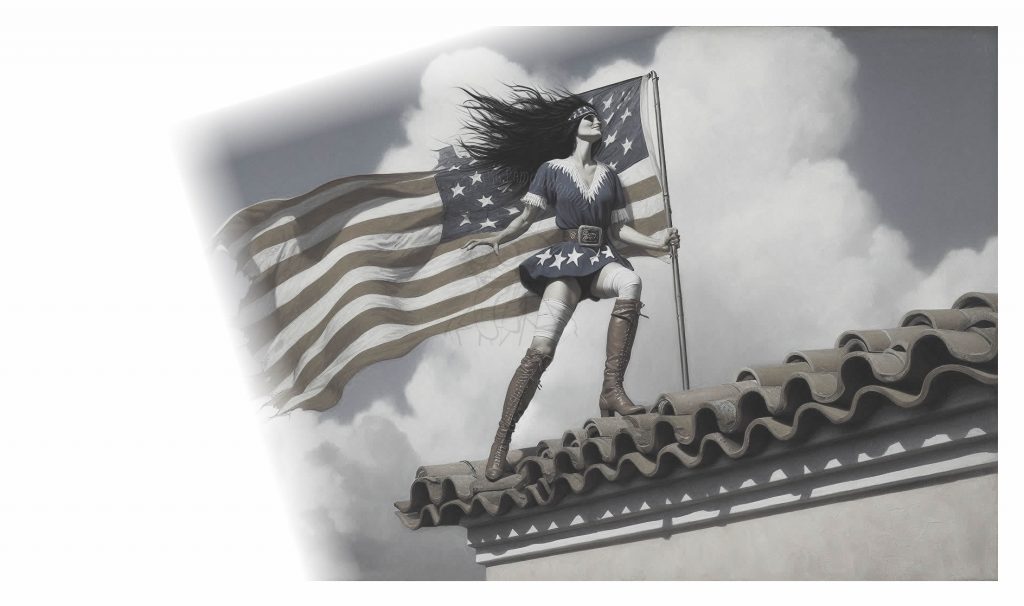
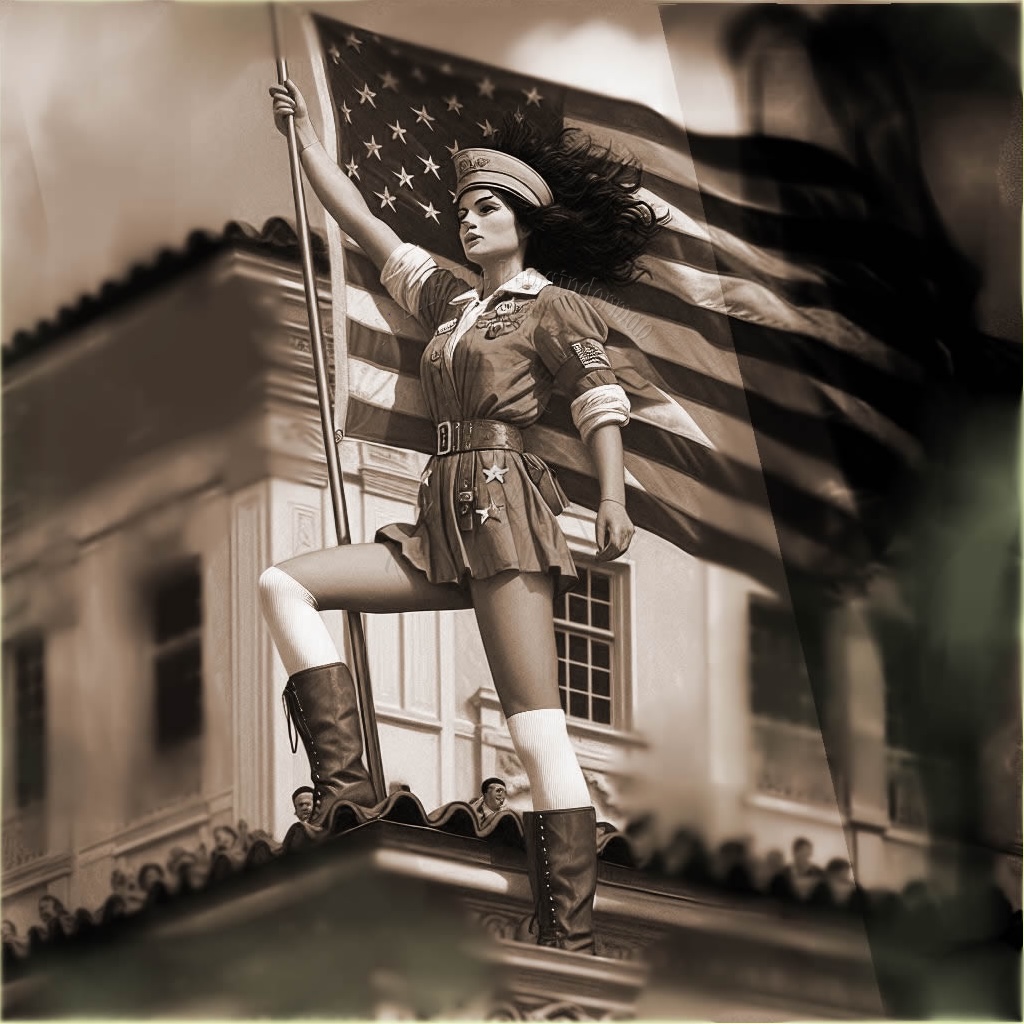
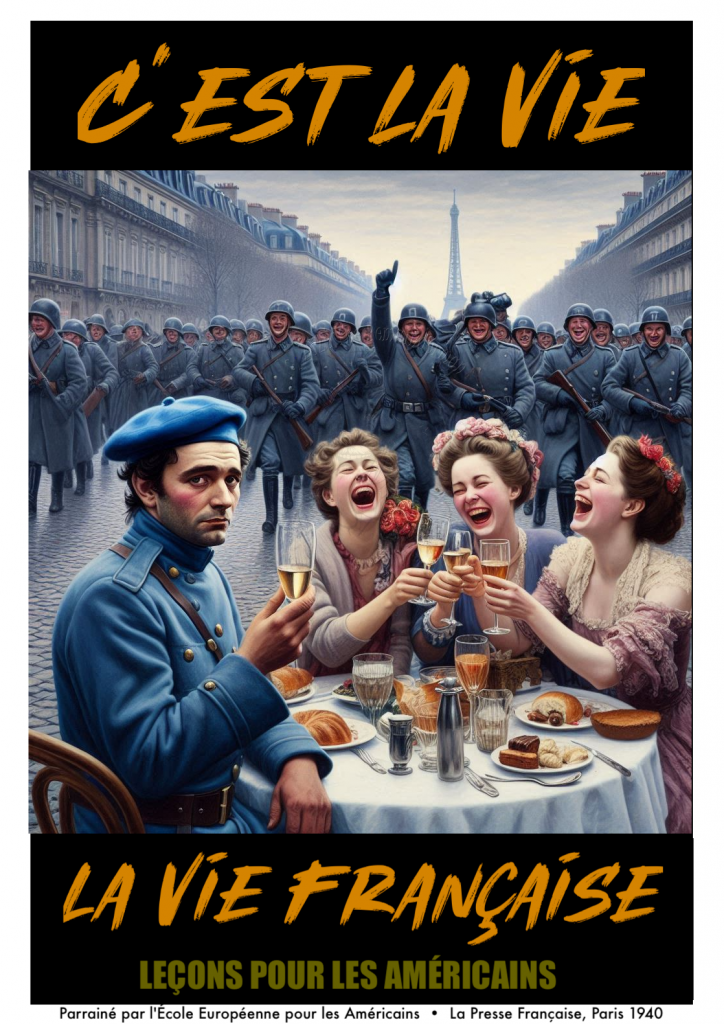
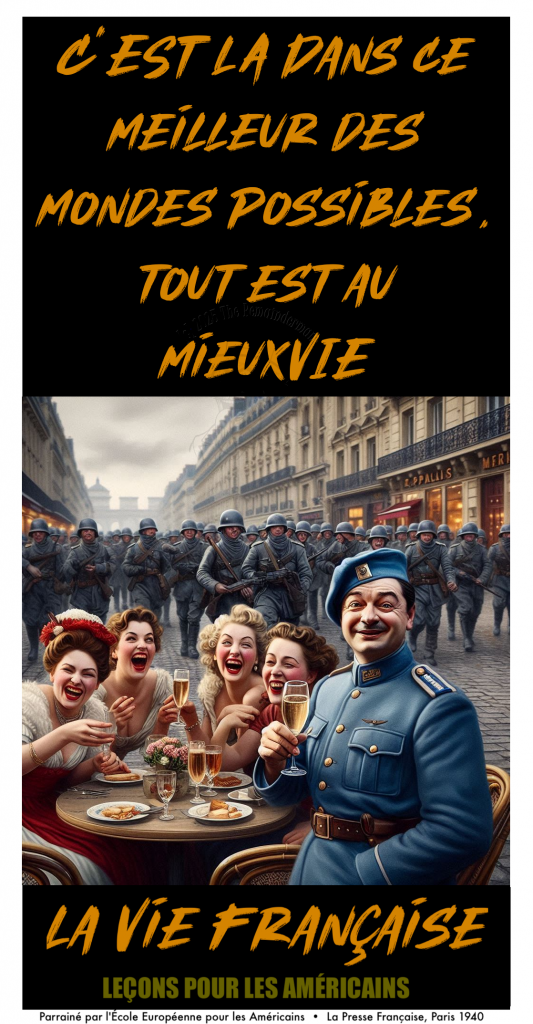
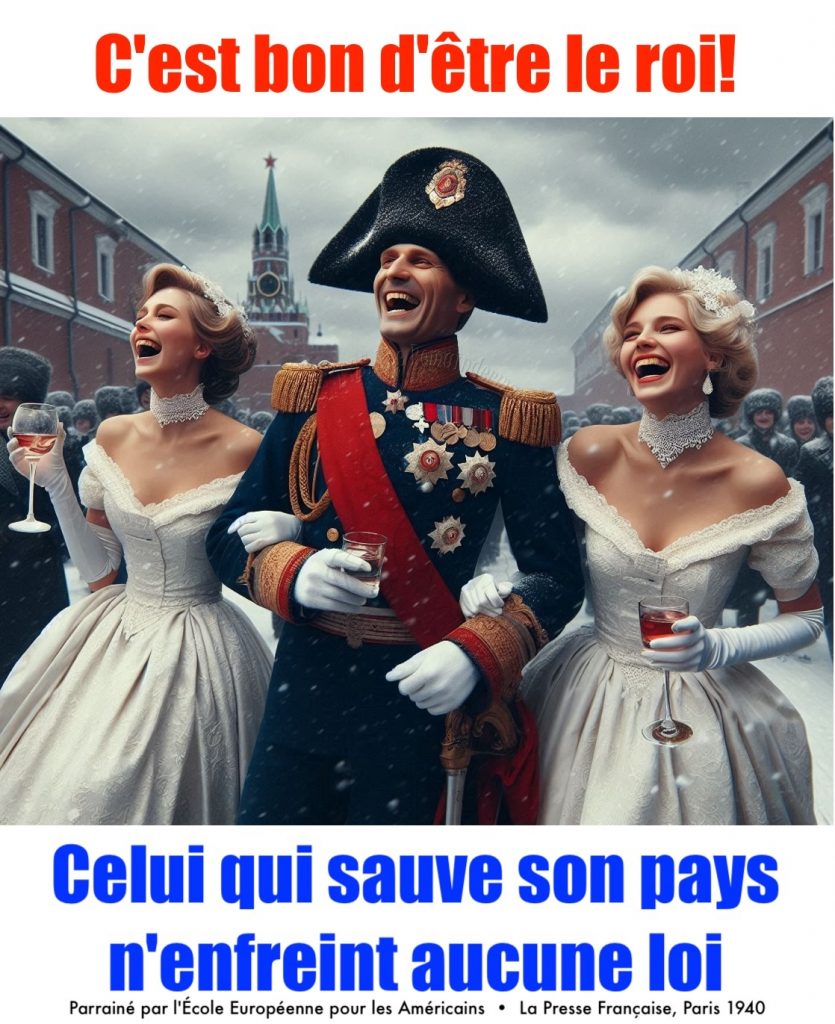
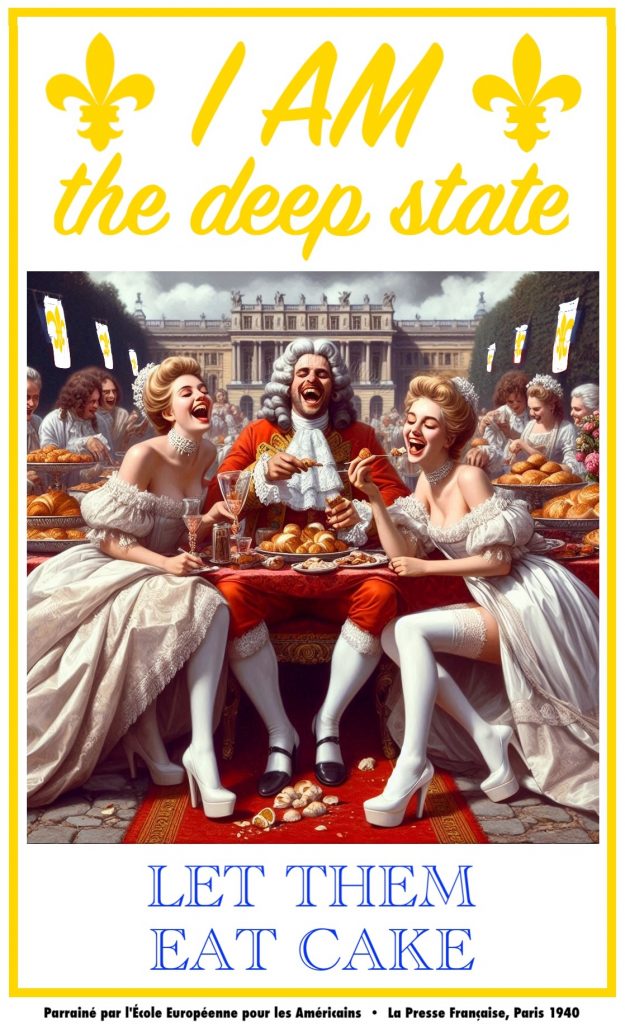


This section’s title is not intended to preach to Americans, but rather to clarify that while I am culturally deeply rooted in the Anglosphere, I have great respect for the French and my goal here is not to echo old jokes, but rather to help Americans recognize that we cannot well laugh at the French without pausing to ask whether their experiences are any different from our own.
These images are about the soul of America, not France; and the extreme hostility and division of America into two camps of people who don’t seem able to communicate with one another any more, even though our interests as fellow Americans are 98% aligned and only 2% unaligned, a problem I end up addressing most squarely in the last image, 1783.
The more I focused on propaganda, freedom, and civility in the present as the point, the less-relevant it was to limit examples to any specific historic time period. But as it happens, my starting point was WW2, the contemporary Golden Age of Comics, and what America’s obsession with fundamentally anti-democratic and anti-egalitarian superheroes might say about its challenges with self-awareness. Particularly since I found support for something I had long suspected: That not only was the original idea of a “superman” or “overman” underlying American superheroes the selfsame theory of Friedrich Nietzsche that inspired the Nazis, the inspiration for Superman’s moniker, the so-called “Man of Steel,” was none other than the mass-murdering dictator Joseph Stalin (“Stalin” was a pseudonym he adopted meaning “Man of Steel” or “steel man”). Numerous factors contributed to the success of the character and the genre, but critical to it was the fact that many people were highly receptive to the idea. Fantasies about how wonderful communism and fascism were in other countries in the 1930s were grossly misplaced, but understandable to some extent; and I wouldn’t hold them against anyone with the intellectual honesty and personal humility to learn over time when faced with their overwhelming and obvious flaws. But understandable or not, believing such fantasies was then, and is now, an existential threat to the things that really can make the future better: democracy, capitalism, and above all individual liberty. Falling for the fantasy that celebrities, the wealthy, strongmen, the vanguard of the proletariat, the purebloods, philosopher-kings, or any other category of special people can be or ought to be trusted with power over others is stupid and dangerous. Deciding that one cannot be bothered to educate oneself and vote responsibly, is stupid and dangerous. It reminds me of the old joke about playing cards: How can you tell who the sucker at the table is? It’s the coward who surrenders their faith in individuals, including their own agency and responsibility, then acts surprised when he or she is exploited. D’uh.
It’s no accident I picked crazy Esmeray as the primary representative of the US in this series of pictures. She expresses both my hopes that America can be its best, and my fear of its worst excesses.
Literature Section “07-04 DEFEND THE CONSTITUTION—Lessons for Americans”—more material available at TheRemainderman.com—Part 4 of Chapter Seven—Accompanying Images: 1774, 1779-1780, 1784-1788,1790, 1925, 2025—Published 2025-06-24 to 06-29—©2025 The Remainderman. This is a work of fiction, not a book of suggestions. It’s filled with fantasies, idiots, and criminals. Don’t believe them or imitate them.
1790 07-04 Long Live the Republic—DEFEND THE CONSTITUTION—2025-06-24; Esmeray; propaganda poster. I made this one, then discarded it in favor of the French posters when I started developing them, then brought it back to fill out the series because I like the image, and the reason I originally liked it was the way it seemed to draw a parallel between the experiences of the US and France, and the challenges they have faced in the past and they both face today.
1774 07-04 American Maniac—2025-06-24; Esmeray; more an explanation of the concerns and anxieties that helped motivate me to make this series, than WW2 subject matter itself. This image seeks to set up the issue by distinguishing between citizenship and partisanship. We can be members of the same civil society, and deal with one another as colleagues, without agreeing about everything. We can put the interests of our country ahead of other things, without being mindless jingoists or accepting an aggressive view towards the world, or a servile view of our relationship with US authorities. I would be pleased if the entire series could encourage Americans to reconsider the benefits of working with others since the evidence is overwhelming that everyone is better off when they cooperate to improve everyone’s lot, and is worse off when they view the world as a zero-sum game where the goal is to take as much from your neighbors as you can get away with. I’m not saying there isn’t a time for fighting or a time for standing up for yourself; there certainly are. But there’s nothing about 2025 that would make this the time for disrupting any alliances, let alone all of them. We as a country need to remember the value of cooperation and mutual respect.
1779 07-04 Raising a Flag over Mar a Lago (faded) & 1780 07-04 Raising a Flag over Mar a Lago (sepia)—2025-06-25; Esmeray; old personal photos. Compare
https://en.wikipedia.org/wiki/Raising_a_Flag_over_the_Reichstag. The source photo is one of the most iconic photographs of World War 2, and came to mind when I was thinking about how to portray patriotism and superhero powers together: waving the flag on top of a building in Metropolis came to mind. And it involves Stalin, with a whole raft of ironies introduced by the fact the whole war in Europe started when Stalin and Hitler agreed to split Eastern Europe by force between them, and Western democracies objected to this horrific plan. Ultimately, I decided to use Mar a Lago as the building because it was symbolic of much of what I object to about America’s current situation. Long before Trump bought the property or ran for office, the US government refused to accept the estate as a gift for use as a Winter White House because it was too expensive to maintain. He later obtained the property at a discount by threatening to destroy its value if the owner didn’t sell, a tactic representative of his history of sharp dealing. After converting it to a club and being elected President, he used it into a way to charge people for access to a public official (himself) by making himself available in the club, which is only accessible to people who pay an exorbitant membership fee, much like the bribe-takers on the steps of the Vatican who once sold access to the Pope. Metaphorically, we do need to take back government from the place where it is wrongfully conducted in the corrupt twilight between private and public sectors, to the light of day. The idea that this is an acceptable or mainstream way to run a country ignores the fact that it is what traps most of the world’s population in a cycle of poverty and oppression to this day. We shouldn’t be accepting backsliding but instead should be trying to make our country better.
1784 07-04 Such is life (ABRIDGED version) & 1785 07-04 Everything is for the best in this, the best of all possible worlds (ABRIDGED version)—UNABRIDGED VERSIONS CONTAINING FASCIST IMAGERY AVAILABLE AT PATREON.COM/THEREMAINDERMAN—2025-06-26; Martin (in 1784) & Cutter (in 1785); propaganda posters. Compare: https://www.alamy.com/vichy-france-ww2-propaganda-poster-against-communism-french-militia-supported-by-marshal-petain-anti-semitic-xenophobic-authoritarian-propaganda-poster-for-the-recruiting-recruitment-of-nazi-appeasement-appeasers-french-facist-militia-1943-signed-eric-ww2-world-war-ii-image466236767.html?imageid=218485E2-ED7B-4276-89BF-7FACCE305A9C&p=66052&pn=1&searchId=92fed0677eaf89ed1cdf2bada5be10e0&searchtype=0 (for basic composition, coloring and words) and https://www.alamy.com/vichy-france-propaganda-poster-1941-ww2-vintage-world-war-two-propaganda-poster-issued-by-the-vichy-government-world-war-ii-laissez-nous-tranquilles!-leave-us-in-peace!-image-of-a-french-family-planting-a-tree-with-four-black-beasts-three-dogs-and-a-three-headed-snake-symbolizing-the-enemies-indicated-in-writing-de-gaulle-freemasonry-the-lie-the-jew-ready-to-attack-the-land-of-france-and-its-inhabitants-vichy-france-french-rgime-de-vichy-is-the-common-name-of-the-french-state-tat-franais-headed-by-marshal-philippe-ptain-during-world-war-ii-image593595906.html?imageid=E4B5FB98-DA7E-43B7-B4CB-F56FEB1CA341&p=66052&pn=1&searchId=92fed0677eaf89ed1cdf2bada5be10e0&searchtype=0 for the thinly veiled theme that Germany has saved Frenchmen from any need to worry their pretty little heads about world events. Translation: C’est la vie Such is life (but I did not find any clear etymology online); Dans ce meilleur des mondes possibles, tout est au mieux In this best of all possible worlds, everything is for the best (apparently a shortened form of the original quote from Candide, instead of the direct language from the play). La Vie Française The French Life (in abridged version); Milice Française French Militia (in unabridged version).
Parrainé par l’École Européenne pour les Américains Sponsored by The European School for Americans; La Presse Française The French Press. The French Militia was a paramilitary organization created to assist the SS and Gestapo in suppressing the French Resistance. The rapid French collapse in World War Two resulted from a number of factors, including most sympathetically, that France—like its capitulating leader, Petain—was demonstrably a shell-shocked and traumatized version of the country that resisted the previous German invasion a generation before, that had been one of the primary battlegrounds of World War One, and that its military forces and tactics were greatly overmatched by those of Germany. But while acknowledging France lacked the endless steppes of the USSR or the English Channel of the UK to provide it with breathing room to sort itself out, it is a fact the USSR and the UK similarly had their asses summarily handed to them in their first encounters with the Wehrmacht, but fought on despite deprivations and losses. It is impossible to avoid some sense, though, that the swiftness of the capitulation, before the country’s armed forces were categorically defeated, reflected the fact French devotion to their own cause and Republican government were less passionate and committed than that of countries with governments and traditions much less worthy of loyalty than theirs. To me, that loss of faith and belief in a system that at the end of the day was worth fighting for or better yet improving upon, resulting in capitulation to a much-worse form of government, resonates strongly with the corrosive hostility of the internal US “culture wars” with their focus on lashing out at other Americans in indulgence of people’s petty rivalries and gripes, and at foreign countries for our own weaknesses, rather than remembering the much greater interests and values embodied in our history our moral strength and even our institutions, as frayed as they are. Certainly, our interests as Americans, humans, and moral agents are aligned with making democracy, liberty, and cooperation with others stronger, rather than abandoning them; and the benefits of our cooperation and tolerance are orders of magnitude larger than the ultimately small and unworthy bickering to which much of contemporary dialog often sink. Giving up did not serve the French very well in World War Two and it’s not serving Americans very well now. Yes, the French, galvanized and reminded of their values and heritage by the shock of occupation, returned better and stronger with a vibrant, even defiant, democracy after the war was over. But could we please pull our collective heads out and work together, within the rule of law, to make America better without having to shoot ourselves repeatedly in the hands, feet, and other body parts first, to remember why that’s a bad idea?
1786 07-04 It’s good to be the king! He who saves his Country does not violate any law (ABRIDGED version)— Unabridged version containing graffiti including sexual themes at 07-04 DEFEND THE CONSTITUTON at Patreon.com/TheRemainderman
—2025-06-27; Penny, Chastity; propaganda poster. Compare https://www.youtube.com/watch?v=8z8SpgmF0sA and https://www.reuters.com/world/us/trump-if-it-saves-country-its-not-illegal-2025-02-16/
Translation: (here translated *to* French) It’s good to be the king C’est bon d’être le roi; (here shown as translated in both directions) Celui qui sauve son pays n’enfreint aucune loi He who saves his Country does not violate any law; Parrainé par l’École Européenne pour les Américains Sponsored by The European School for Americans; La Presse Française The French Press. The first quote is from Mel Brooks’s History of the World Part 1 (1981); but to me, it captures the attitude of public figures who openly and unapologetically use their position and power for personal ends, to the wreckage of the state and private institutions, confident that the sheep below them will not question or criticize him for anything he does. The second quote is brilliant, because the President deliberately and knowingly quoted the dictator Napoleon I who returned France to monarchy and converted wars to defend the French Revolution, into wars for his personal aggrandizement and gain. Napoleon did have some achievements, like modern civil codes and courts to enforce them, on the plus side of his ledger; but it’s hard to understand how they could possibly outweigh his failed efforts at continental conquest, let alone his successful destruction of the last vestiges of the First French Republic. The fact the US President drew the same parallel between himself and Napoleon, and thus the US and France, supports my own comparisons in this series. The quote is also evocative of Richard Nixon’s claim that “when the President does it, that means that it is not illegal, by definition,” highlighting the extraordinarily dangerous tone of the President’s current speech. I have portrayed Napoleon making the statement while partying down during his very brief occupation of Moscow as the first snow of the season starts to fall, to highlight how unlikely the claim of being a singular savior of a nation really is.
1787 07-04 I AM the deep state. Let them eat cake (FRENCH & ENGLISH versions)—2025-06-28; Chastity, Penance; propaganda poster. Compare https://en.wikipedia.org/wiki/L’%C3%89tat%2C_c’est_moi and https://en.wikipedia.org/wiki/Let_them_eat_cake. Translation: L’État, c’est moi I am the state; Qu’ils mangent de la brioche Let them eat cake. I like that this propaganda poster is built on not one, but two different quotations I was taught in history, but that are now questioned or rejected by historians (as discussed at the referenced links). At once, it reminds us that we have to adapt to changes, whether they make us comfortable or not; and be guided by reason and empirical evidence, rather than unfounded superstitions, no matter how comforting our superstitions are; yet at the same time, they’re particularly potent examples of propaganda because (to me at least) it’s clear why they have gathered such force despite their doubtful provenance. Wherever they came from, they capture important insights in a pithy, memorable fashion. They reflect realities and attitudes that still drive human behavior today by those who imagine their life circumstances are the only moral justification they need or care about. At the same time, they require us to exercise judgment about what has been proven, disproven, can be proven or disproven, or is unknown and unknowable; and how our knowledge of the truth (or lack thereof) must be a moral bound on discourse. I have pushed these issues further by adding the word “deep” because I think it may help clarify the relevance of an old quote to our present situation and debates, rather than misleading anyone about an issue that isn’t intended to be the focus here (literal translation).
1788 07-04 After us, the flood. Weep and watch us eat, you revolting peasants!—2025-06-29; Penance, Chastity; propaganda poster; compare https://en.wikipedia.org/wiki/Apr%C3%A8s_moi%2C_le_d%C3%A9luge. Translation: Après nous, le déluge After us, the flood; Pleurez et regardez-nous manger, paysans révoltés ! Weep and watch us eat, you revolting peasants! I was taught King Louis XV was responsible for the first quote, acknowledging that the rot and vested interests inherent in the French Ancien Regime would not long survive the forces unleashed by the Enlightenment. Apparently it was more likely (and indeed fitting on some level) that his mistress, Madame de Pompadour, said it in the plural “Après nous, le déluge”. Scholars debate exactly who said it, and what they were referring to; but it still speaks to me, and seems an apt reflection of the stark conflict between the Enlightenment, reason, compassion, and knowledge on the one hand; and stupid bloody violence and tyranny on the other. The second phrase has no specific antecedent but simply expresses outrage at the degree to which people define themselves by how they believe they rank, instead of on their own terms. Whether it’s ordinary people showing deference to celebrities, the privileged, and the successful; or the fortunate few spitting on people below them simply because they can, it’s a loathsome, negative, hollow, and immoral way to live. It also references an old joke about peasants revolting.